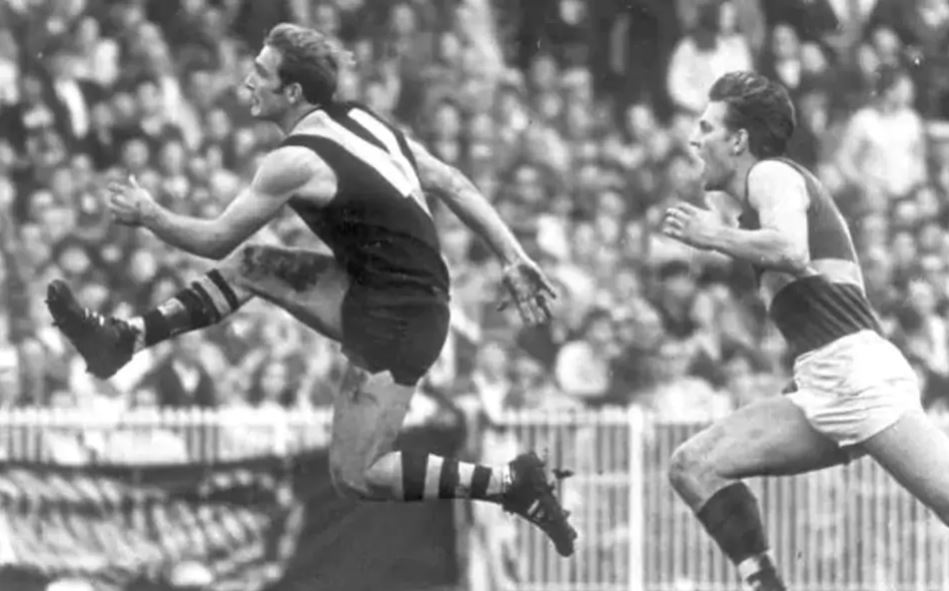Michael Bowden celebrates his old club’s 2019 AFL premiership win with sons Joel, Patrick and Kane. Photo: ASHLEA CAYGILL
“Unbreakable Rock” (Alella Books), a collection of writing by former Richmond premiership player Michael Bowden, begins: “My mother was a committed Catholic. My father was a committed fisherman, football supporter and drinker. They are the reason I joined the seminary, played AFL football and chose to avoid drink throughout my life”.
Born in 1947, Bowden grew up in Melbourne’s “drab” eastern suburbs, where religion and life were “indistinguishable”.
While in the seminary, Bowden acquired a lifelong passion for the work of 19th century priest/poet Gerard Manley Hopkins. He uses a phrase of Hopkins, “brute beauty”, to describe Ron Barassi. The part of the book dealing with his departure from religious life is lightly sketched, but he does record realising that he had adjusted his times for attending Mass to coincide with those of a young female parishioner who had caught his attention.
He met his wife Judy at university, became a teacher and played 59 games with Richmond, including a memorable performance in the Tigers’ victory over Carlton in the 1969 grand final.
His six sons all played football – Sean, Joel and Pat for Richmond, Rhett and Kane for Port Melbourne in the VFL, and Charlie for Collingwood and Carlton reserves. Michael Bowden played his last game of footy, in Alice Springs, at the age of 49.
In a foreword to “Unbreakable Rock”, his daughter Majella writes of Bowden’s “tremendous, unstoppable energy”.
A moving obituary for him written by members of his family after his death earlier this year said: “He had an almost child-like love of the sporting field, and the pure contest that went with sport – and the outdoors. He would marvel at natural beauty, subtle changes in the country, a bird riding high on its wings, “…the achievement of, the mastery of, the thing” he would say, quoting G.M. Hopkins”.

Michael Bowden in action for Richmond. He played 59 games from 1967-71 and was part of the 1969 premiership team.
In 1971, Bowden coached Robinvale, taught at a local Catholic school and began encountering Aboriginal people. If you don’t get that traditional Aboriginal culture, whatever else it may be, is deeply spiritual, you’re not going to make the starting line in terms of mutual understanding. Michael Bowden got it like tanks get water.
In 1983, he applied for a job on the Pitjintjatjara tribal lands in the far north-west of South Australia. His writing on that period ends with an account of being taken out with a group of young men who were going through initiation. He doesn’t actually say he was initiated, but his account shows that he was taken deep inside what is a hidden practice.
He writes: “We were in a sacred ngura (place) where the Tjukurrpa (the big spirit) was resonant. The dancing and other ceremonies are embedded in my deep consciousness, as I’m sure they were for each young man. Each initiate was informed about his relationship to the sacred place and to every other man in the company. It was here in the southern fringes of the Musgrave Ranges that I experienced deep insights about being-in-relationship and the mystery of creation in one encompassing envelope”.
The bulk of “Unbreakable Rock” is Bowden’s Ph D thesis which he submitted in 2018. I’m not going to attempt to summarise the book. I’m going to attempt to summarise 12 of its pages – a chapter titled “The Arrernte Names of God”.
I encourage those who have no interest or belief in God to read on, if only to admire the labour involved in trying to make two radically different cultures add up to a single picture. It involves a mountain of thought and, to be frank, it took me three attempts to get to the summit.
The book is preceded by a 2018 statement by 25 Arrernte elders endorsing what Bowden has written. The statement says, in part: “We are happy with his writing. He understands our way of life. He understands our way of thinking. He is listening to us … He is listening to the country. He is the echo of our lives”. As I see the land of my birth and the social and racial fractures contained therein, this is high praise.
PLEASE HELP US CONTINUE TO THRIVE BY BECOMING AN OFFICIAL FOOTYOLOGY PATRON. JUST CLICK THIS LINK.
The Arrernte (pronounced Ar-ren-duh) people of central Australia were, in Bowden’s words, hidden from the European gaze until 1872. The first missionaries to get to them were German Lutherans, who differed from other European missionaries in that they didn’t try to suppress the local language and culture but rather work through them.
The first two Lutherans, Kempe and Schwarz, thought therefore that “it would be useful … to discover a latent or incipient concept of God within Arrernete beliefs”. So far so good.
Kempe decided the Arrernte word altyerre meant God. Altyerre was translated as meaning “that which has always been so, and always was”. But there was a difficulty. The Lutheran God, the 19th century western God, was that and more. He was the Creator, an active presence, a personality who puts on the show of life.
The Reverend Kempe decided the Arrernte word arrpmurnintja meant the Creator. Again, not quite. Arrpmurnintja denotes an idea of creation – specifically, an idea to do with country and the creative spirit of the land. But again, there is no character in it like the Creator character of the Old Testament who Bowden called High God.
The next Lutheran pastor at Hermannsburg, Carl Strehlow, conceded altyerre did not mean High God. Rather, it meant what whitefellers would later call “the Dreaming”. Bowden disapproved of that term, instead describing altyerre “the eternal or everlasting story upon which the Arrernte base their ritual life and whole existence”.
In 1899, the Lutherans came under intellectual attack. Baldwin Spencer, the professor of biology at the University of Melbourne (and later president of the Victorian Football League), combined with a central Australian linguist called Gillon to argue that the word altyerre related to dreams.
We now enter the realm where race and politics make dangerous bedfellows. The significance of Baldwin Spencer’s claim was, in Bowden’s view, as follows: “Spencer believed Aborigines were at a primitive state of humanity”. He reduced their “religious beliefs” to stories seen in their dreams. “Arrernte religiosity, as far as it went, was based on dreaming, a primitive way of understanding the transcendent”.
Bowden jumps from that 19th century debate to the Arrernte version of “Our Father Who Art In Heaven”, written in the 1980s for the visit by Pope John Paul II to Alice Springs. The difference now is that it is Arrernte people making the cross-cultural connections and finding a language for shared beliefs.
The Arrernte prayer begins, “Unte Ngkarte” which is translated as, “You are our Father”. Ngkarte is not the Arrernte word for father. It means the leader in ceremonies. Bowden writes: “In a sense a Ngkarte is extremely powerful, even having power over life and death should another infringe the ritual of ceremony or reveal secret business one is not entitled to”. But a Ngkarte is also a healer required to look after and care for the community.
The full first line of the Arrernte Our Father, “Unte Ngkarte, Unte Altyerre”, translates as “You are our Father, You live in Heaven”. Altyerre does not mean Heaven. What it describes is the inheritance of identity that a child receives through its mother’s father in Arrernte culture.
Bowden writes: “In the Arrernte kinship system, identity is passed on through skipped generations”. From its mother’s father, every Arrernte child learns “the place from which his or her spirit is derived, and relationally, where he or she sits in the eightfold skin system … it strictly prescribes whom one can marry and what the skin name of a child of that union is, and then subsequently who that person can marry and so on in a never-ending cycle. This is the everlastingness that altyerre metaphorically encodes”.
The word for the idea of identity that a child receives from its father’s father is aknganentye. Arrernte elder Margaret Kemarre Turner is quoted as saying: “Aknganentye is a name that means your totem, the Symbol for the Land. That name … means “Beginning Story”.
Explaining the dot painting he gave Pope John Paul II in 1986 in Alice, Arrernte elder Wenten Rubuntja used the word aknganentye to describe Jesus’s Father’s father whose place is Heaven.
By the end of his life, the Richmond footballer who made it his mission to journey towards the soul of this nation described himself not as a Catholic but an Altyerre Catholic.
He died of Motor Neurone Disease on Easter Saturday 2020, surrounded by extended family, a much loved and respected man. His last words, scrawled on a piece of paper, were: “How lucky am I”.












